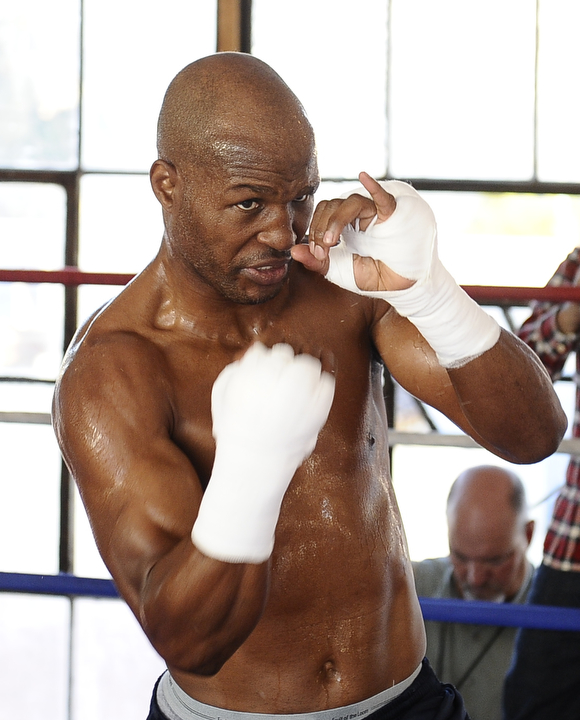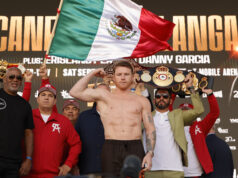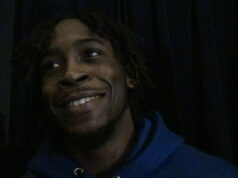By Bart Barry-

Saturday at a 1/3-full Forum in Inglewood, Calif., handpicked American light heavyweight opponent Joe Smith retired Bernard Hopkins just before Hopkins’ 52nd birthday, on HBO, by rendering Hopkins unfit to continue their match in the eighth round. Smith beat on Hopkins throughout the fight, regardless of what narrative twists HBO replays tried to impart, and even taunted “The Executioner” by switching to southpaw when he wasn’t otherwise winging righthands fearlessly – exactly the way a man should do against someone twice his age. Hopkins invented an alternate ending to his KO-by, of course, and HBO let him, of course, but the good news nevertheless was twofold: Smith won the right way, and Hopkins is now retired.
That Smith knocked Hopkins clean out the ring with a left hook brought from aficionados more gasps of relief than horror, knowing as we all did how many times Hopkins had used threats of retirement and elastic conceptions of ending his career his way – and who’s going to deny a legend that! – to promote fights no fan asked for, or at least didn’t ask for in any way measurable by boxoffice receipts. From his flattened spot on the concrete outside the ring Hopkins rose, in a show of indomitable will and tactical cunning and immortal somethingorother, and began to harangue nearby officials about an illegal push that injured his ankle and was nothing like either the left hook that put him through the ropes or the left hook that put him geometrically nearer to spectators than he was to Joe Smith, suing posterity (and any other eligible parties) for a palatable outcome.
“Bernard is a difficult person to deal with,” said the late-Bouie Fisher in 2005, after Hopkins fired him. “He wants all the glory, he wants all the credit, he wants all the money. It’s all about him, him, him.”
What few dared mention during his career and no one will mention now that it finally ended is how much more Hopkins frightened the boxing media than actual boxers, how much more writers and broadcasters discussed Hopkins’ predation than other fighters did. Hopkins was by no means a media creation, for he was a self-creation first and foremost, but he was a media confirmation, filibustering as he did every interview with very little lucidity but a whole lot of autobiography and portentously delivered cliches before closing his monologues with an allusion to Graterford Penitentiary, his nearly inevitable exclamation point. He intimidated the hell out of journalists. Exploiting in his subjects some combination of privilege-induced guilt and physical inferiority Hopkins discomfited his media opponents early in interviews then talked in circles about himself until he was certain “legend” or “one of a kind” or “unbelievable” would make its way in whatever his subject soon wrote or said about him.
But few actually liked being round the guy. Plenty of writers admired him and felt honored by his meandering answers to their stock questions – as if a quarterhour soliloquy from Hopkins somehow burnished with genius an inquiry like “Talk to me about training, Champ” – but none came away from an experience with Hopkins enduringly proud of the way he comported himself while in Hopkins’ presence. That was all part of the Hopkins schtick, er mystique, exploiting others’ fears – a task at which Hopkins never failed, except in his matches with Jermain Taylor, Joe Calzaghe, Chad Dawson and Joe Smith.
“(Hopkins) thinks he can intimidate me because he’s been to prison for robbery,” said Calzaghe before beating Hopkins in 2008. “So you burgled somebody, you brave boy. That makes you a thug, not a fighter. It makes you an idiot.”
Before anyone says there are too many incredibly good moments in Hopkins’ career to approach a summary of the great man in fewer than three volumes he might admit there were a historic number of insipid moments in that storied career as well. For every Felix Trinidad there was a Morrade Hakkar, for every Antonio Tarver there was a Carl Daniels, for every Kelly Pavlik there was an Enrique Ornelas; when Hopkins wasn’t neutralizing a much larger or younger opponent he was nigh unwatchable.
Honesty is ever more believable than even masterful insincerity, and so: I esteemed Hopkins highly as any fighter in the world the night he beat Tito till Papa Trinidad personally intervened and I was pleasantly surprised by his activity and effect against Tarver in the first “final” match of Hopkins’ career (lest we forget the retirement angle was used to hoodwink HBO into broadcasting Hopkins-Tarver in lieu of Cotto-Malignaggi, 10 1/2 years ago) and I was impressed if dismayed by how easily Hopkins unmanned Pavlik in 2008, but all that was done happening eight years ago and since then I’ve mostly felt exploited by the entire Hopkins hustle: danger / legend / Graterford / danger / legend / legend / danger / Graterford / Graterford / legend.
If there be a genius for confrontation Hopkins has it, the sort of exquisite intuition only to be found in one who hones his expertise by treating every single interaction in every day of his life as a confrontation, through four decades, but it’s not a pleasant place to visit even vicariously and I sure as hell wouldn’t want to live there or have B-Hop as a neighbor. No, I will not miss Bernard Hopkins, but I’m glad in Joe Smith he’s given us a compelling opponent for Sergey Kovalev while Andre Ward avoids that rematch.
Bart Barry can be reached via Twitter @bartbarry










